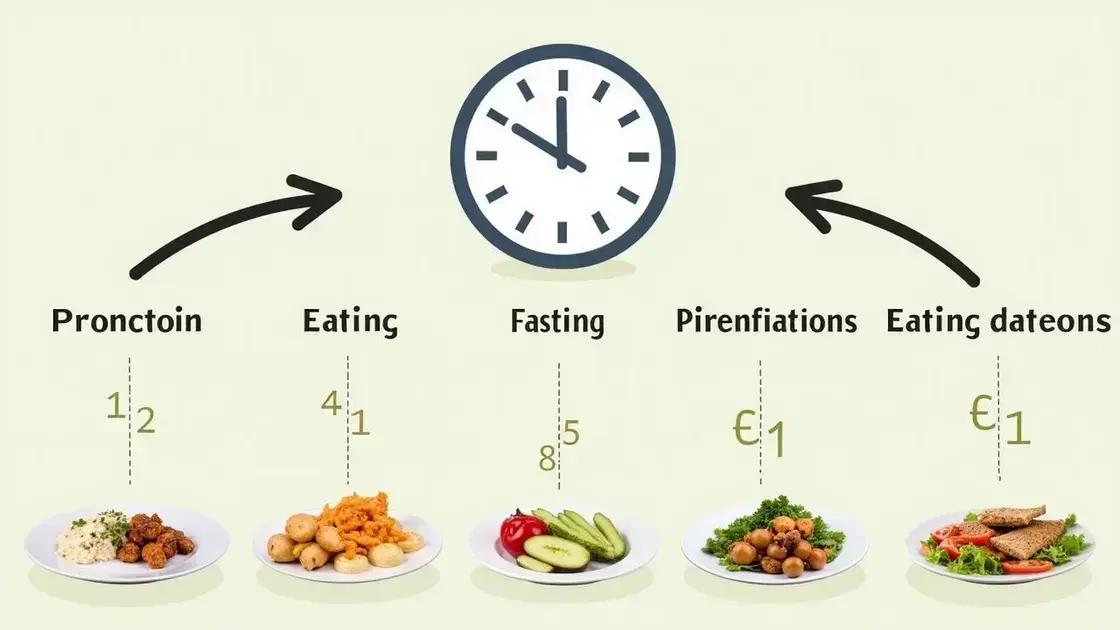The growing trend of intermittent fasting among older men provides numerous health benefits, including weight management, improved metabolism, and enhanced brain function; however, potential risks such as nutritional deficiencies and low blood sugar should be considered before starting this dietary practice.
The growing trend of intermittent fasting among older men is taking the health world by storm. This dietary approach not only supports weight management but also enhances overall well-being. Many older men are discovering that intermittent fasting can improve metabolism and promote longevity. In this article, we will dive into what intermittent fasting is, explore its health benefits specifically for older men, provide practical tips for those who want to start, and discuss any potential risks involved.
Understanding Intermittent Fasting

Intermittent Fasting (IF) is a dietary pattern that alternates between periods of eating and fasting. Unlike traditional diets that focus on what to eat, intermittent fasting emphasizes when to eat. This approach has gained popularity among many, especially older men looking to improve their health without strict meal plans.
There are several methods of intermittent fasting. The most common include:
- The 16/8 Method: This method involves fasting for 16 hours a day and eating during an 8-hour window. For many, this might mean skipping breakfast and having the first meal at noon.
- The 5:2 Method: Here, you consume a normal diet for 5 days of the week and restrict calories to around 500-600 on 2 non-consecutive days.
- Alternate-Day Fasting: This method alternates days of regular eating with days of fasting.
Why is it Popular? Older men are finding intermittent fasting appealing for several reasons. It’s flexible and can fit easily into busy lifestyles. Plus, many report feeling more energetic and alert when following this diet pattern.
Potential Mechanisms suggest intermittent fasting may promote fat loss, improve insulin sensitivity, and enhance cellular repair processes. This can lead not only to weight loss but also to better overall health as individuals age.
Health Benefits for Older Men

Health Benefits for Older Men who practice intermittent fasting (IF) are numerous and significant. Research indicates that this eating pattern can lead to several positive health outcomes, which are especially important as men age.
Weight Management: One of the most immediate benefits of intermittent fasting is the potential for weight loss. By restricting eating to specific windows, many older men find it easier to reduce total calorie intake, leading to more effective weight management.
Improved Metabolism: Intermittent fasting can boost metabolism. Studies show that this dietary approach may increase levels of norepinephrine, a hormone that helps break down fat and enhance energy use.
Heart Health: Many older men are at risk for heart issues. IF has been linked to lower blood pressure, reduced cholesterol levels, and improved triglyceride levels, all of which contribute to better heart health.
Enhanced Brain Function: Research suggests that intermittent fasting may support brain health by promoting the production of brain-derived neurotrophic factor (BDNF), a protein that encourages the growth of new neurons and is linked to better cognitive functions.
Insulin Sensitivity: Older men often experience reduced insulin sensitivity, increasing the risk of type 2 diabetes. IF can improve insulin sensitivity, which may help these individuals manage their blood sugar levels more effectively.
Cellular Repair: IF encourages the body to initiate autophagy, a process where cells remove damaged components, supporting healthier cellular function and potentially slowing aging.
With these health benefits in mind, older men are increasingly drawn to intermittent fasting as a way to improve their quality of life and maintain health as they age.
Practical Tips for Starting

Practical Tips for Starting intermittent fasting can help older men ease into this new eating pattern smoothly. Here are some ideas to get started:
1. Choose Your Method: Start by selecting an intermittent fasting method that fits your lifestyle. Popular methods include the 16/8 method, where you fast for 16 hours and eat over an 8-hour window, or the 5:2 method, where you eat normally for five days and limit calories on two non-consecutive days.
2. Start Gradually: If jumping straight into a fasting routine feels daunting, consider starting with shorter fasting periods. For instance, try fasting for 12 hours initially and gradually increase it to 14 or 16 hours as you become more comfortable.
3. Stay Hydrated: Water is your best friend during fasting periods. Drinking water, herbal teas, or black coffee can help curb hunger and keep you hydrated without breaking your fast.
4. Focus on Nutrition: During your eating windows, prioritize nutrient-dense foods. Incorporate plenty of fruits, vegetables, whole grains, lean proteins, and healthy fats to ensure you are getting the vitamins and nutrients your body needs.
5. Listen to Your Body: Pay attention to how you feel as you start. It’s normal to feel hungry or fatigued initially, but if you experience severe discomfort, it’s important to reassess your fasting plan. Adjust your eating window or consult with a healthcare professional.
6. Be Consistent: Consistency is key for success in intermittent fasting. Try to establish a routine that works for you. This can help your body adapt to the new eating schedule and maximize the benefits.
With these practical tips, older men can confidently start their intermittent fasting journey and enjoy the potential health benefits.
Potential Risks and Considerations

Potential Risks and Considerations with intermittent fasting (IF) are important to understand, especially for older men. While IF offers many benefits, it may not be suitable for everyone and can have some drawbacks.
1. Nutritional Deficiencies: If not planned carefully, intermittent fasting can lead to inadequate nutrient intake. During eating windows, it’s essential to consume a well-balanced diet to ensure you meet your nutritional needs.
2. Low Blood Sugar: Some individuals, especially those who may be taking medications for diabetes, can experience low blood sugar levels (hypoglycemia) when practicing intermittent fasting. It’s crucial to monitor blood sugar levels regularly and consult a healthcare provider if necessary.
3. Increased Hunger and Cravings: Initially, fasting can increase hunger and food cravings, making it challenging to stick with the plan. Older men might find it tougher to cope with these feelings, leading to potential overeating during eating windows.
4. Dehydration: During fasting periods, it’s easy to forget to drink enough fluids. Dehydration can lead to headaches, fatigue, and less energy. It’s important to drink water or other zero-calorie beverages to stay hydrated.
5. Impact on Social Life: Meal times are often social events, and intermittent fasting can limit participation in certain gatherings. Older men may feel excluded from social outings that revolve around meals, which can affect their overall enjoyment of life.
6. Health Conditions: Men with specific health conditions or those taking certain medications should consult a healthcare professional before starting intermittent fasting. This is vital to ensure that fasting will not interfere with their health or treatment plans.
Awareness of these potential risks can help older men make informed decisions about incorporating intermittent fasting into their lifestyle.
In Conclusion: Embracing Intermittent Fasting for Better Health
The growing trend of intermittent fasting among older men reflects a shift towards optimizing health and well-being. As outlined, intermittent fasting offers various health benefits, including improved metabolism, weight management, and enhanced brain function.
However, it is essential to approach this lifestyle change mindfully. Understanding the practical tips for starting, as well as potential risks and considerations, can help ensure a successful experience.
By prioritizing a balanced diet during eating windows and listening to your body’s needs, older men can harness the benefits of intermittent fasting while minimizing drawbacks. With proper planning and awareness, this dietary pattern can be a valuable tool in promoting long-term health.
FAQ – Frequently Asked Questions about Intermittent Fasting for Older Men
What is intermittent fasting?
Intermittent fasting (IF) is a dietary pattern that alternates between periods of eating and fasting, focusing on when to eat rather than what to eat.
What are the main health benefits of intermittent fasting for older men?
IF can lead to weight management, improved metabolism, better heart health, enhanced brain function, and increased insulin sensitivity.
How can I start intermittent fasting?
Begin by selecting a method that suits your lifestyle, such as the 16/8 method. Start gradually and listen to your body’s needs.
Are there any risks associated with intermittent fasting for older men?
Yes, potential risks include nutritional deficiencies, low blood sugar, increased hunger, dehydration, and health complications related to pre-existing conditions.
Can I drink beverages while fasting?
Yes, you can consume zero-calorie beverages like water, herbal tea, and black coffee during fasting periods to stay hydrated without breaking your fast.
How can I ensure I’m getting enough nutrients while intermittent fasting?
Focus on nutrient-dense foods during your eating windows. Include a variety of fruits, vegetables, whole grains, lean proteins, and healthy fats.












